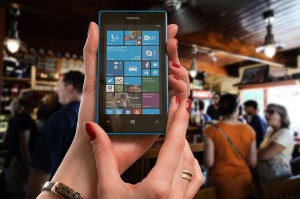- Calls to this hotline are currently being directed to Within Health, Fay or Eating Disorder Solutions
- Representatives are standing by 24/7 to help answer your questions
- All calls are confidential and HIPAA compliant
- There is no obligation or cost to call
- Eating Disorder Hope does not receive any commissions or fees dependent upon which provider you select
- Additional treatment providers are located on our directory or samhsa.gov
Using Technology to Support Eating Disorder Recovery

Contributor: Courtney Howard, B.A., Executive Assistant at Eating Disorder Hope and Addiction Hope
Technology and social media can often be used to promote disordered eating or distorted body image, including through pro-anorexia and pro-bulimia websites. However, there are also many ways in which technology can be used to connect individuals in a positive way and promote recovery.
There are apps designed specifically for eating disorder recovery that can help those just starting off in their journey or anyone further along in recovery who is looking to stay on track. Peer support groups and online forums can provide another layer of support for those struggling with disordered eating.
The Pro-Recovery Movement is another leader in using modern technology to connect those in eating disorder recovery with like-minded individuals. By providing individuals who are struggling with a sense of belonging and support, this movement has the potential to truly impact the recovery community.
Apps for Eating Disorder Recovery
 There are many recovery apps available for your phone or tablet that can provide support or hold you accountable in your recovery. From mood check-ins to mindfulness tips, these apps provide a wide range of support.
There are many recovery apps available for your phone or tablet that can provide support or hold you accountable in your recovery. From mood check-ins to mindfulness tips, these apps provide a wide range of support.
Recovery Warriors is an online resource center for individuals in eating disorder recovery. Using art, music, and a podcast to spread its message of empowerment, the organization also launched an app called Rise Up + Recover. This app features cognitive behavioral therapy (CBT) techniques to support users as they monitor their own diet and exercise in a way that promotes intuitive eating and mindfulness. In doing so, the app is able to identify triggers specific to each user.
The Recovery Record is another free app that includes regular mood check-ins before and after meals. Users log their daily food intake and can connect to their dietitians through the app so they are updated at each session. Of course, these systems require transparency to be effective. Though food logging is an integral part of this app, the focus is on mood and emotions surrounding food.
There are also many apps designed for general mental health that can support eating disorder recovery. For example, 7 Cups of Tea is a helpful app that connects users with “trained listeners.” This informal and anonymous counseling with a (highly trained) stranger can provide a kind of immediate relief and support that someone in recovery might seek.
Online Peer Support
 Online forums and other forms of peer support can give those struggling with eating disorders a sense of community and gain insight from those who are further along in the recovery journey. There are many pro-anorexia or pro-bulimia forums that promote disordered eating, so these recovery forums are carefully monitored to ensure there is no triggering language used.
Online forums and other forms of peer support can give those struggling with eating disorders a sense of community and gain insight from those who are further along in the recovery journey. There are many pro-anorexia or pro-bulimia forums that promote disordered eating, so these recovery forums are carefully monitored to ensure there is no triggering language used.
The National Eating Disorders Association hosts many online forums for those touched by eating disorders in any way. This includes peer support forums for those in recovery, siblings of those with eating disorders, gender-specific forums, and more.
The Looking Glass Foundation, based out of the United Kingdom, also hosts online support groups led by a trained moderator. You can sign up for a session, then sign in at the appropriate time, as though you were attending a meeting in person.
Pro-Recovery Movement
 The Pro-Recovery Movement is an online community that promotes recovery and an intuitive relationship with food and exercise. Anyone can subscribe to become a member of this community and spread hope to others battling eating disorders worldwide.
The Pro-Recovery Movement is an online community that promotes recovery and an intuitive relationship with food and exercise. Anyone can subscribe to become a member of this community and spread hope to others battling eating disorders worldwide.
Resources available within the Pro-Recovery Movement include a wall for members to post inspirational quotes that have been helpful to their recovery in the hopes that they will also inspire others, as well as articles and blogs that support recovery.
This positive approach to eating disorder recovery through community support and self-love can be incredibly helpful for those reaching out for help or looking to support others.
How Can Technology Help Me?
There are many benefits to modern technology, particularly when it comes to seeking help. You can use these resources anonymously and from the comfort of your own home. Though they are no substitution for professional help, they can set you on the path toward recovered life.
If you know you are struggling and want to seek help, reaching out in the form of one of these apps or online peer support groups can be an extremely beneficial first step. The best thing you can do for yourself is to take that first step today.
Community Discussion – Share your thoughts here!
How has technology helped you in your recovery? Do you know of any other helpful apps you would like to share with our community?
 About the Author: Courtney Howard is the Executive Assistant for Eating Disorder Hope and Addiction Hope. She graduated summa cum laude with a B.A. from San Diego State University, holds a paralegal certificate in Family Law, and is a Certified Domestic Violence Advocate. After obtaining her certification as a life coach, Courtney launched Lionheart Eating Disorder Recovery Coaching in 2015 and continues to be a passionate advocate for awareness and recovery.
About the Author: Courtney Howard is the Executive Assistant for Eating Disorder Hope and Addiction Hope. She graduated summa cum laude with a B.A. from San Diego State University, holds a paralegal certificate in Family Law, and is a Certified Domestic Violence Advocate. After obtaining her certification as a life coach, Courtney launched Lionheart Eating Disorder Recovery Coaching in 2015 and continues to be a passionate advocate for awareness and recovery.
The opinions and views of our guest contributors are shared to provide a broad perspective of eating disorders. These are not necessarily the views of Eating Disorder Hope, but an effort to offer discussion of various issues by different concerned individuals.
We at Eating Disorder Hope understand that eating disorders result from a combination of environmental and genetic factors. If you or a loved one are suffering from an eating disorder, please know that there is hope for you, and seek immediate professional help.
Last Updated & Reviewed By: Jacquelyn Ekern, MS, LPC on June 22, 2016
Published on EatingDisorderHope.com

The EatingDisorderHope.com editorial team comprises experienced writers, editors, and medical reviewers specializing in eating disorders, treatment, and mental and behavioral health.

